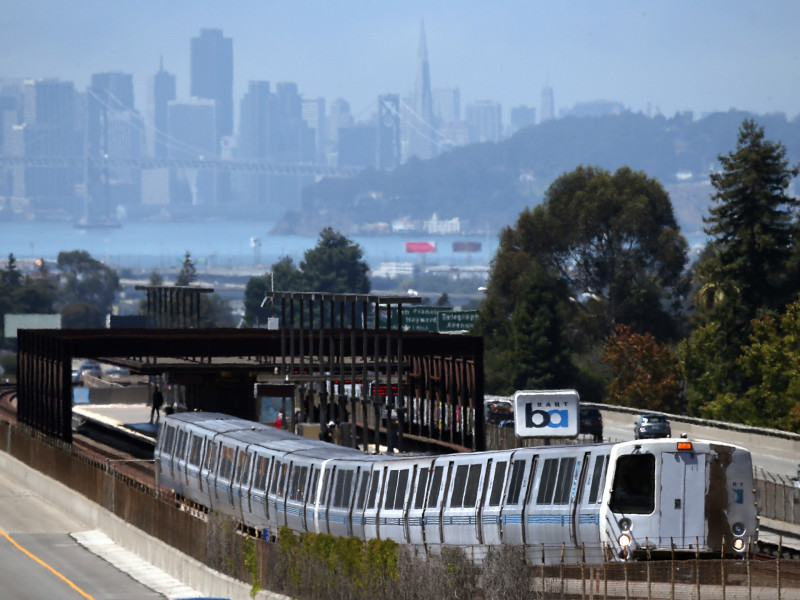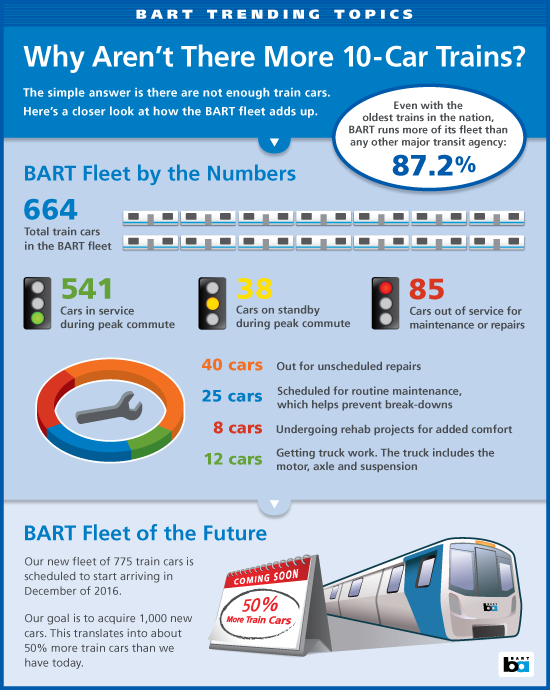BART officials said there are no safety concerns for riders taking trains between the stations.
Follow Twitter updates from BART below.
[twitterbart]
Update, 12:05 p.m. Monday: BART will continue to operate a bus shuttle service between the Pittsburg/Bay Point and North Concord/Martinez stations, while crews try to determine the cause of an electrical power surge along one stretch of track that damaged 58 cars on Wednesday.
The transit system is also running a test train between the stations periodically with riders on board. BART began those tests last night.
"Where we're at right now, and where we've been for the last couple of days, we've used some fairly sophisticated instrumentation that we've put on board a test train, and we've been running back and forth, both in that area and elsewhere in the system in the hopes that we would have a repeat and could get some recorded data that would allow us to analyze and come to a conclusion on what exactly the problem was," Paul Oversier, assistant general manager of BART, said on KQED's Forum Monday.
Oversier said that the cause of the electrical surge was still not known, but that the damage to the cars was caused by "extreme voltage transients." Those voltage spikes damaged semiconductor components known as thyristors, mostly on "C" cars. Oversier called "C" cars some of the most versatile because they can operate in the lead, end or middle of the train.
Oversier said BART made improvements to cars over the weekend and has returned 36 to service since Friday. He said BART requires 579 cars to operate morning service, but the transit system was running 557 cars Monday.
"In terms of car availability, we're moving forward." Oversier said. "We've got a plan that hopefully over the next week or two will allow that trend to continue, barring, of course, problems like this appearing elsewhere in the system."
Tom Radulovich, president of the BART Board of Directors, said the system, which was designed in the 1960s, is vulnerable to disruption.
"We have four lines in the East Bay, and they converge and run in one single line from West Oakland to the city," Radulovich said. "So when anything happens on that one line, (it) very quickly replicates throughout the entire system. The saying is that 'when BART goes down, it goes down big.' "
Radulovich said there's not a lot of resiliency built into BART, but said the system is trying to implement it as it can.
Listen to the full Forum episode here below.
Update, 4 p.m. Friday: BART says it's conducting intensive testing of a stretch of track where electrical power surges damaged dozens of cars on Wednesday.
But the agency says that section of the system, between North Concord and Pittsburg/Bay Point, will remain closed and that a bus bridge between those stations is expected to continue at least through Monday.
BART spokeswoman Alicia Trost said Friday afternoon that a test train equipped with special measuring gear is being run across the affected stretch of track to try to find the source of the rogue voltage.
"A specialist who has been flown in from the East Coast is on that train as well, and we're trying to pinpoint the exact location this spike in voltage is occurring and get to the bottom of why it's happening," Trost told KQED's Tara Siler.
The specialist "understands high-voltage and electrical systems and has helped other transit systems troubleshoot and identify complex problems like this," Trost said. "So we’re hoping he and our experts can get to the bottom of this today.”
But she cautioned passengers not to get their hopes up about a return to normal service over the weekend.
"It will be great if we get service back up and running, but we would rather people plan to expect bus bridge to the end of Monday," she said.
Trost said the number of train cars in service had fallen from 534 on Thursday to 521 Friday. That compares with the 590 the district says run on a typical weekday.
But she added that BART mechanics hoped to have about 40 of the 58 cars sidelined by the Wednesday power surges back in service over the next couple of weeks. That would be possible, she said, by borrowing intact components from some out-of-service train cars to repair some of the vehicles damaged this week.
"So there's some good news in terms of the crowding" on the system, Trost said.
Original post (Thursday): BART says it's trying to cope with a shortage of train cars throughout its 104-mile system after a still undetermined electrical problem knocked 50 cars out of service Wednesday and shut down operations between the North Concord and Pittsburg/Bay Point stations.
The agency said Thursday afternoon that the bus bridge that's been ferrying passengers between the two Contra Costa County stations will be running at least into Friday's morning commute.
Meantime, crews will continue investigating what caused the electrical problem that damaged the cars less than a month after a similar issue near downtown Oakland and the Transbay Tube damaged propulsion systems on dozens of train cars.
BART spokeswoman Alicia Trost described the problem between Pittsburgh/Bay Point and North Concord as "extreme voltage spikes that damage cars at any given moment."
She said BART was operating with 534 cars on Thursday instead of the normal complement of 590. That forced the agency to run shorter trains than usual and to simply suspend some scheduled runs. Trost said that 11 trains were missing one car, five trains were missing two cars and three trains were "out of circulation."

